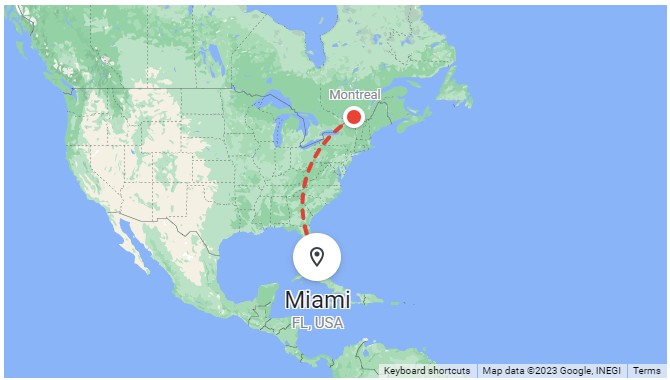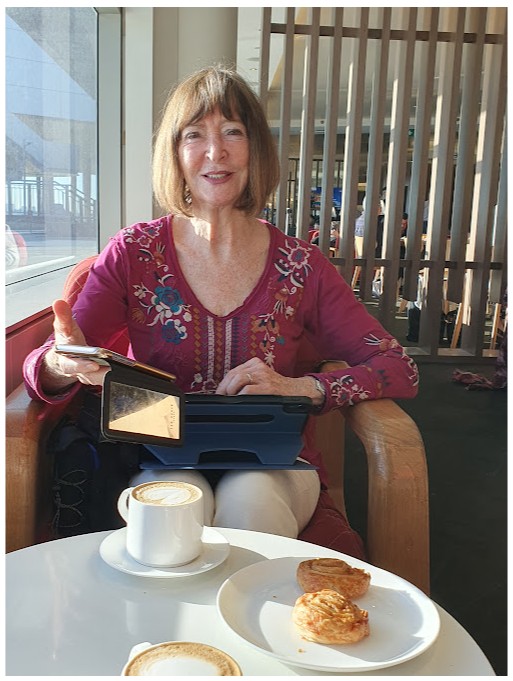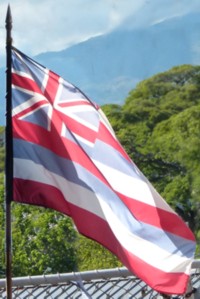North America

- Details
- Written by: Richard_McKie
- Parent Category: Travel
- Category: North America
- Hits: 5464
In Part1, in July 2023, Wendy and I travelled north from Los Angeles to Seattle, Washington, and then Vancouver, in Canada, from where we made our way east to Montreal.
In Part2, in August 2023, we flew from Montreal, Quebec, Canada, down to Miami, Florida, then Ubered to Fort Lauderdale, where we joined a western Caribbean cruise.

At the end of the cruise, we flew all the way back up to Boston.
From Boston we hired another car to drive, down the coast, to New York.
After New York we flew to Salt Lake City, Nevada, then on to Los Angeles, California, before returning to Sydney.

- Details
- Written by: Richard_McKie
- Parent Category: Travel
- Category: North America
- Hits: 4494
In July and August 2023 Wendy and I travelled to the United States again after a six-year gap. Back in 2007 we visited the east coast and west coast and in 2017 we visited 'the middle bits', travelling down from Chicago via Memphis to New Orleans then west across Texas, New Mexico, Nevada and California on our way home.
So, this time we went north from Los Angeles to Seattle, Washington, and then into Canada. From Vancouver we travelled by car, over the Rockies, then flew east to Toronto where we hired a car to travel to Ottawa and Montreal. Our next flight was all the way down to Miami, Florida, then to Fort Lauderdale, where we joined a western Caribbean cruise. At the end of the cruise, we flew all the way back up to Boston.
Seems crazy but that was the most economical option. From Boston we hired another car to drive, down the coast, to New York. After New York we flew to Salt Lake City then on to Los Angeles, before returning to OZ.
As usual, save for a couple of hotels and the cars, Wendy did all the booking.

Breakfast in the Qantas lounge on our way to Seattle
Wendy likes to use two devices at once

- Details
- Written by: Richard_McKie
- Parent Category: Travel
- Category: North America
- Hits: 89533
When we talked of going to Hawaii for a couple of weeks in February 2018 several of our friends enthusiastically recommended it. To many of them it's a nice place to go on holidays - a little further to go than Bali but with a nicer climate, better beaches and better shopping - with bargains to be had at the designer outlets.
Waikiki
To nearly one and a half million racially diverse Hawaiians it's home.
Downtown Hilo
To other Americans it's the newest State, the only one thousands of miles from the North American Continent, and the one that's more exotic than Florida.

- Details
- Written by: Richard_McKie
- Parent Category: Travel
- Category: North America
- Hits: 136985
In September and October 2017 Wendy and I took another trip to the United States where we wanted to see some of the 'middle bits'. Travel notes from earlier visits to the East coast and West Coast can also be found on this website.
For over six weeks we travelled through a dozen states and stayed for a night or more in 20 different cities, towns or locations. This involved six domestic flights for the longer legs; five car hires and many thousands of miles of driving on America's excellent National Highways and in between on many not so excellent local roads and streets.
We had decided to start in Chicago and 'head on down south' to New Orleans via: Tennessee; Georgia; Louisiana; and South Carolina. From there we would head west to: Texas; New Mexico; Arizona; Utah and Nevada; then to Los Angeles and home. That's only a dozen states - so there are still lots of 'middle bits' left to be seen.
During the trip, disaster, in the form of three hurricanes and a mass shooting, seemed to precede us by a couple of days.
The United States is a fascinating country that has so much history, culture and language in common with us that it's extremely accessible. So these notes have turned out to be long and could easily have been much longer.

- Details
- Written by: Richard_McKie
- Parent Category: Travel
- Category: North America
- Hits: 43079
What can I say about Cuba?
In the late ‘70s I lived on the boundary of Paddington in Sydney and walked to and from work in the city. Between my home and work there was an area of terrace housing in Darlinghurst that had been resumed by the State for the construction of a road tunnel and traffic interchanges. Squatters had moved into some of the ‘DMR affected’ houses. Most of these were young people, students, rock bands and radically unemployed alternative culture advocates; hippies.
Those houses in this socially vibrant area that were not condemned by the road building were rented to people who were happy with these neighbours: artists; writers; musicians; even some younger professionals; and a number were brothels.
